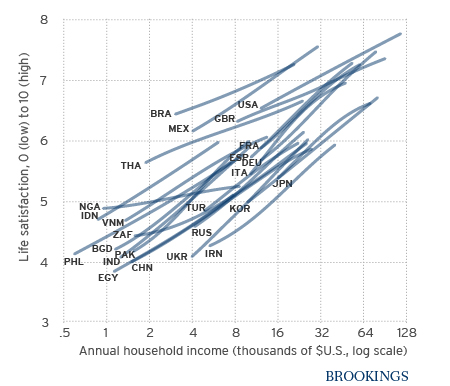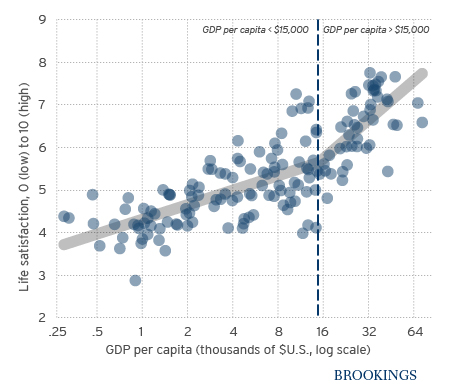Yes, money can buy you happiness
At least according to one new study


A free daily email with the biggest news stories of the day – and the best features from TheWeek.com
You are now subscribed
Your newsletter sign-up was successful
We all know the sayings: Money can't buy you happiness; more money, more problems.
But while those are nice little feel-good platitudes, they may not hold water in the real world, according to a new study from economists Betsey Stevenson and Justin Wolfers.
By mapping income versus self-described happiness in several countries worldwide, the study's authors found that the more money people had, the happier they tended to be. The trend was clear across the board, leading the economists to conclude that there's "no evidence of a satiation point," a theoretical level of contentment past which more cash doesn't translate into more happiness.
The Week
Escape your echo chamber. Get the facts behind the news, plus analysis from multiple perspectives.

Sign up for The Week's Free Newsletters
From our morning news briefing to a weekly Good News Newsletter, get the best of The Week delivered directly to your inbox.
From our morning news briefing to a weekly Good News Newsletter, get the best of The Week delivered directly to your inbox.
Two charts in the report tell the story. The first plots income groups within countries by happiness, clearly showing a correlation in higher income to higher reported happiness.

"While there are some differences in the slopes, the more remarkable feature is simply that for every country, the relationship estimated at low incomes appears to hold in roughly equal measure at higher incomes," the authors note. "In particular, there is no evidence that the slope flattens out beyond any particular 'satiation point' in any nation."
The second chart compares countries to each other, revealing that richer nations report markedly higher levels of happiness. If more money didn't really mean more happiness, that line should level off. Yet instead, the slope actually increases as it moves toward the richer end of the spectrum, indicating that the "well-being–income relationship extends to them as well."

As Slate's Matthew Yglesias points out, the charts use a logarithmic scale, which shows that a given percent change in income produces a fixed change in happiness, regardless of the original income level. For instance, a doubling of wealth produces the same percent change in happiness whether that initial income is $1,000 or $1,000,000.
A free daily email with the biggest news stories of the day – and the best features from TheWeek.com
That's to say that a $5,000 increase in per capita GDP will generate a lot more happiness for a poor country than a rich one. And by the same token, a $5,000 increase in income will generate a lot more happiness for a poor family than for an affluent one. This is a key grounds for believing both in the importance of economic growth and in the importance of concern about the distribution of that growth. To be a little crude about it, halving the income of a millionaire will let you double the income of many poor households. [Slate]
The findings run counter to a widely held theory that economist Richard Easterlin posited 40 years ago, which argued that people do not become happier as they gain wealth. Responding to the new study, Easterlin cautioned that it looked at snapshots of income levels, and not at how happiness changed for individuals as their personal incomes rose.
"If you compare people at a point in time, those with higher income are typically happier," he told MarketWatch. "But you cannot generalize from the point of time relationship to the relationship over time."
Others have similarly questioned whether the findings show any real causation, or merely correlation. Happier people may be more likely to get promoted and receive a raise. Or richer nations may have the stability and resources to foster more pleasurable societies, leading to higher levels of happiness overall. Wolfers concedes that the study doesn't necessarily mean money itself drives happiness, saying, "I suspect what's actually going on is that income is a marker for something else. It may be that what really makes us happy is leading fulfilling lives."
So while the study does show that richer people and richer countries tend to be happier than their poorer counterparts, it doesn't necessarily mean you can spend your way to happiness. So relax. You're fine with just the one iPhone.
Jon Terbush is an associate editor at TheWeek.com covering politics, sports, and other things he finds interesting. He has previously written for Talking Points Memo, Raw Story, and Business Insider.



